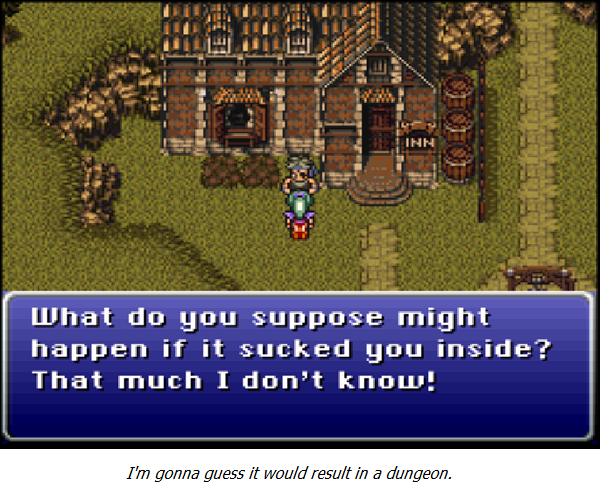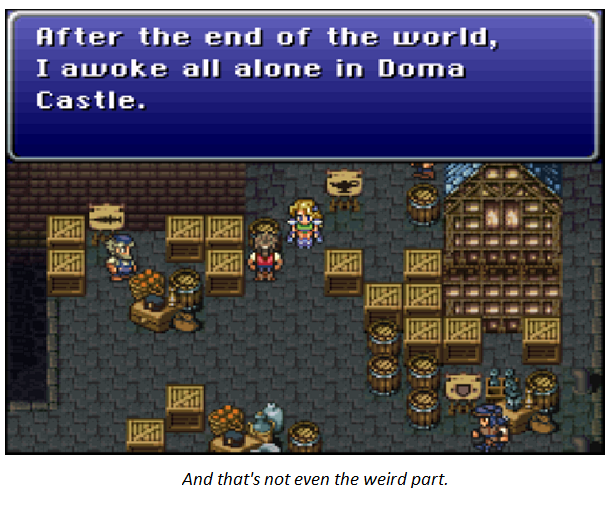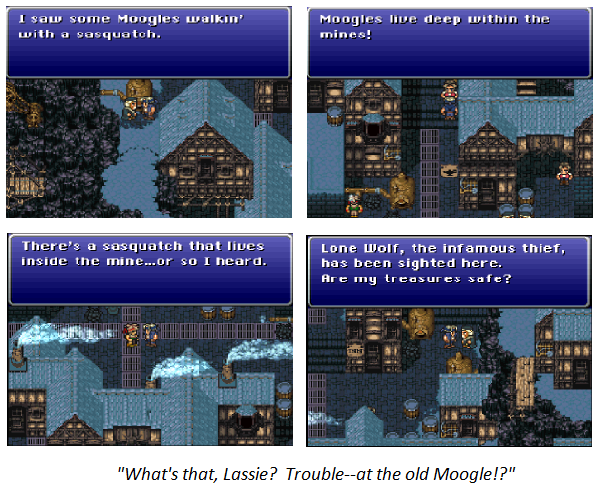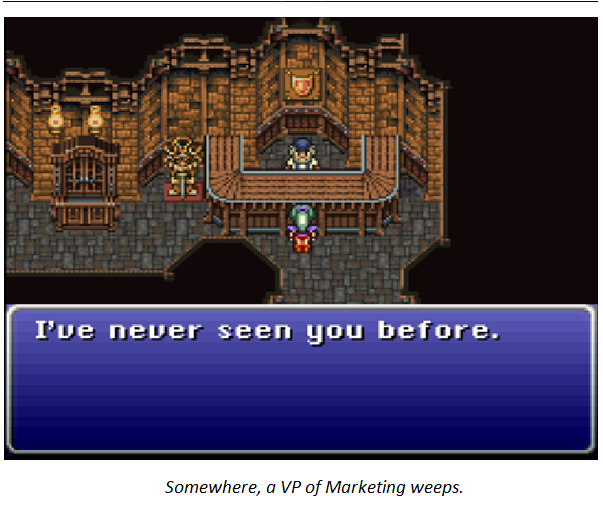NPC Irony & The Sociology of an Imaginary World

The Short Version This section of the chapter is a kind of sociology of the videogame world, focusing on the role of NPCs. The communications coming from NPCs tend to fall into two groups: ironic communication and narrative communication. Ironic communications are veiled instructions for the game, written so as to not break the narrative spell. (I.e. "I hear that dinosaurs hate lightning!") Narrative communications are additions to the script, which embellish the events, characters, places and things in the virtual world. ("You grew up in this village.") This section divides NPCs by function, across the two categories above and several different sub-categories. Additionally, FF6's NPC content is compared statistically with two other games: Majora's Mask and Tales of Symphonia.
One of the most important ways that a designer (rather than just a writer) communicates with the player is through Non-Player Characters, or as we know and love them, NPCs. One of the nice things about studying the design of Final Fantasy 6 is that although NPCs have become more robust technologically since 1994, their purpose has hardly changed at all. NPCs still exist to do the same things they've always done in RPGs. So the question is, then, what are NPCs there to do? In short, NPCs are there to provide information about the game. There are many different kinds of information that NPCs need to provide, from gameplay tips to story embellishments, and everything in between. As I see it, these tips break down into two essential categories: ironic communication and narrative communication. Ironic communication, or as I call it NPC irony is based on the need for the creators to tell the player a lot of information about the game and how to play it. They can't simply break the narrative spell they've cast by having every NPC be an instruction manual. Accordingly, it is important for designers to learn how to mask their gameplay instructions with narrative pretext.
For example, if you first entered a town and the NPCs there said things like, "Ghosts don't really exist!" and "I don't really believe in them, but I hear ghosts are afraid of fire," what do you immediately know? Of course, it's obvious that you're going to be fighting ghosts in the very near future, and that you should bring fire-elemental attacks. The NPCs didn't literally say that, but the designer has communicated it to you, clearly. And, as Bender reminds us, any time someone says one thing, but means something other than what's literally stated, it's a form of irony. It's the same in any RPG, and of course is true in FF6.

There are a lot of fine distinctions between different kinds of ironic and narrative information that NPCs need to convey. The way we classify them depends not on how the NPC says something, because that can be an ironic deception, but on what the designers are trying to commuincate to us. The information the designers give or imply determines the category. As I see it, NPC communications can be broken down into categories like so, starting with the ironic categories:
Direction
Directions are the most obvious form of communication from the designer, given through NPCs. Directions are, naturally, direct instructions about an action that the player ought to take. While they don't necessarily need to be ironic, they can be. A man in Narshe instructs you to take his treasures (in the house to the right) before someone less reputable tries to use them. That's a pretty straightforward direction, yet it still falls under the category of NPC irony, because it's player instructions couched in player character instructions.
Similarly, if you're outside a dungeon and someone says, "This is the haunted temple, don't go in--it's dangerous!" the designer is basically telling you: "This is a dungeon, make sure you're ready before going in." It's a little more obviously ironic this time, in that what the character tells you is very clearly the opposite of what the designer is trying to communicate with you. The ironic veil is usually pretty thin with a direction, but it's fairly essential, as it would be too easy for everything in the game to become a bland manual.
A good example of NPC irony and directions is in Kohlingen, in the WoB. An NPC asks, "You a friend of Locke's? He always stops by Rachel's house when he comes here!" This is essentially a direction: if you bring Locke to this location, something interesting will happen. In this case it's a flashback. It's ironic because the characters have no use for this information, but the player will quickly realize that the designer is communicating the presence of an optional story segment. A less ironic example is in Thamasa where one of the NPCs informs you that Strago is trained as a Blue Mage, and can learn monster attacks. There are numerous instances of both ironic and unironic direction, although direction becomes less common in the WoR, where it is often replaced by allusion.
Allusion
Allusions are more highly ironic directions, with one special requirement: they must leave out one essential portion of the directions, either who, how, what, or where, or when but usually not more than one of those. In that sense, allusions are a kind of puzzle that the player needs to figure out by investigating. For instance, one NPC remarks a quest that will take place at Doma Castle.

Demons, Doma Castle? Sounds like fun! He tells you the what (demons), the where (Doma Castle), the how (sleeping there), but not the who. Cyan needs to be in the party for it to happen; this fact needs to be intuited by the player, but it's not an enormous leap to make, considering that Doma is Cyan's home. That gap, however, is the defining aspect of an NPC allusion, and what separates it from a direction. Ironic directions may tell you how to do something obliquely, but they tend to tell you everything you need to know. Allusions make the act of deciphering the quest part of the quest itself.
Allusive information is actually worthwhile specifically because it's opaque gameplay data. It should come as no surprise that gamers like to figure things out for themselves, and allusive communications are no different. NPC allusions are like puzzles, where the player has to figure out what the game designer is trying to tell them. For instance, the last imperial trooper at the colosseum tells you "Talk to the emperor twice." By the time he tells you this, the Emperor is very clearly dead. This allusion is actually referring to Emperor Gestahl's portrait in Owzer's house, which can be examined by using the "talk" button. (There's an NPC in Jidoor who proclaims: "I saw the emperor recently! Well, a painting of him.") Examining it twice reveals yet another allusion: a letter telling you that a treasure is hidden "where the mountains form a star." There's no obvious instruction, although finding the mountains in question is relatively easy. This is a two-step allusion that actually points to a major dungeon with a recoverable character, important Esper, and lots of treasure inside it.
I have observed a fairly widespread rule for making NPC allusions more effective and noticeable (the NPC allusions rule). The rule is: the number of NPCs in a single town/area who provide allusions on the same topic is inversely proportional to the proximity in space and time of the alluded object. Or, in other words, if a bunch of people are talking about the same vague thing in a town, expect that thing to be available to you soon, possibly now--although you might have to go a little bit out of your way to get it. The most shining example of this is the path to acquiring the optional character, Mog. You can see below.

On the other hand there are many things which are much rarer. The Atma weapon, for instance, is mentioned only once. The clue is that it's mentioned in a town close to a large dungeon that is only open once. You're probably not going to get the weapon on your first playthrough, unless you're a dilligent dungeoner. There are, however, many things that are mentioned once in the WoR that, while puzzling, are available forever. Since you can do them in any order, however, there's never a cluster of allusions like in the World of Balance. Rather, these allusions are scattered in various towns, and if you don't talk to everyone, you won't find them! I think this is actually one of the points where FF6 shines: you absolutely do not need a strategy guide to accomplish everything in the game. Somewhere there is an NPC who will give you the hint you need to find all the secrets in the game.
Condition
Conditions are NPC statements about the status of the level of interactivity of a gameplay element. A simple, unironic condition would be something like, "This store is only open at night." That is, access to a gameplay element is limited to the condition of it being nighttime. Conditions have a large range, and can often be highly ironic. A man blocking the only exit of a room, saying, "Can I help you?" is actually a condition, just a highly ironic one. The designer is communicating: "this room cannot be exited until some condition game environment changes, but you'll have to look elsewhere to find out what." A few, finer criteria for condition:
-Conditions do not indicate any possibility for direct player action to change the condition, or else it's an allusion or direction.
-Satisfaction of the condition is often undisclosed: the game tells the player to "go do something else, and come back when the condition is changed, as a consequence of your actions elsewhere."
-Often a condition is a signal for a player to simply wait. Sometimes that means the player doesn't even recognize a condition when they encounter it, and only benefits from the condition when they remember the conditional statement, and go check in at the location where it was issued much later.
Conditional information is often opaque, because it's frequently about things that you cannot do when you encounter it. If you go to the town of Thamasa too early, for example, nobody will sell you any goods. The shopkeepers say, "I've never seen you before," and someone in the town explains that the innkeeper doesn't like strangers. "Yes," you automatically think, "but perhaps they've met my friend: money."

Want to read more? The rest of this section can be found in the print and eBook versions. In fact, the print version of this book has been significantly expanded and revised.